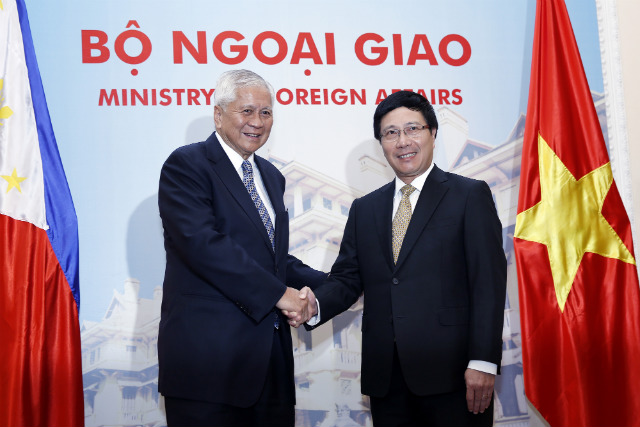From the Philippine Daily Inquirer (Jul 3):
Military owns ‘raw’ terror threat report that ‘should not have been released’
The military has said it provided the intelligence report that warned of terror attacks in this city, which Interior Secretary Manuel Roxas II and Mayor Rodrigo Duterte had discussed last week.
But Brig. Gen. Alexander Balutan, deputy commander of the Eastern Mindanao Command (Eastmincom) here, said the intelligence information was raw and should have not been publicized.
It was Duterte who made the report public after meeting with Roxas.
Balutan said when the military got the information, it was sent to Malacañang as part of the daily briefing for the President.
“We got the information and we informed the President about it,” Balutan told reporters at a news briefing here on Wednesday.
But Balutan said based on military protocol, “information particularly on terror threats (that have not been) verified and raw information, should not be made public.”
In cases of verified information “especially those that concern national security,” he said that the task of making it public would be the duty of the military’s public information officer.
Balutan said that the intelligence information had actually not singled out the city as possible target of terror groups.
He said the cities of Cagayan de Oro, General Santos, Butuan, Koronadal, and other major urban centers in Mindanao had equally been identified and the authorities there also alerted.
“Whether the information is raw or unverified, we have to act on it,” Balutan said.
Up to now, the military continues to look for indicators and is still in the process of verifying the intelligence information, according to Balutan.
Balutan admitted the terror alert came out following the series of the military’s clashes with the Abu Sayyaf in Western Mindanao and the Bangsamoro Islamic Freedom Fighters in Maguindanao.
In Zamboanga City, Lt. Gen. Rustico Guerrero, the Western Mindanao Command chief, said the military has been monitoring terror suspect Abdul Basit Usman, an al-Qaeda-trained bomber “who was recently monitored in Maguindanao.
“We are facing a serious threat and we know he is alive and he is our current target in our operation in Central Mindanao,” Guerrero said.
He said Usman has been hiding inside the camps of the BIFF in Maguindanao and has been training BIFF gunmen on bomb making.
In January 2010, Usman was reported to have been killed, along with several other terror suspects, during a US drone strike in Pakistan.
But according to Guerrero, Usman is alive and teaching the BIFF how to build up its capability by providing IED training.”
A few weeks ago, Guerrero said soldiers from the 6th Infantry Division recovered assorted war materiel, bomb-making equipment and documents during a clash in Maguindanao, which he said belonged to Usman.
As to how they were certain about this, he said the military had worked hard to verify its information.
The National Democratic Front has denounced the national government for its “alarmist moves” in the wake of the terror alert.
Rubi del Mundo, spokesperson of NDF-Southern Mindanao, said it was clear that the announcement of the terror threats was “politicking, irresponsible, careless and clearly concocted.”
“Using as mouthpiece the AFP Eastern Mindanao Command, Benigno Aquino III and his gang led by Mar Roxas have exposed themselves as having aligned their political interests for 2016 with that of the United States Imperialism, Del Mundo said.
“Not content with approving the highly irregular and grossly anti-people Enhanced Defense Cooperation Agreement (EDCA), the puppet US-Aquino regime patently wants Davao City to be its war launch pad of the South”and be popular in the process, a popularity enough to translate into presidential votes,” the communist leader added.
Del Mundo said the people, most especially residents in Davao City, were not stupid and could easily discern that everything was scripted.
“The announcement was suspicious even to ordinary citizens, especially when they see a desperate presidential hopeful in the person of Mar Roxas instigating meetings for security measures with Davao City Mayor Rodrigo Duterte,” Del Mundo said in an emailed statement.
Del Mundo asserted that aside from the political interests, Aquino has been pursuing US military interventionist policies in Asia particularly in Davao and Mindanao.
“What is even more shameless in this whole affair is how the US-Aquino regime pursues US military interventionist policies in Asia, eyeing
Davao and Mindanao as its ultimate war theater, at the expense of national sovereignty and patrimony, Del Mundo said.
Earlier, Duterte revealed that the US government has forwarded their intent to utilize the city’s old airport as a base for its drones program.
The mayor shared that a retired Filipino general connected with the Visiting Forces Agreement talked to him to communicate the request of the US government.
“I told him that I would not allow planes or drones here. It is not that I am scared. I just do not want to make enemies,” Duterte said.
http://newsinfo.inquirer.net/616650/military-owns-raw-terror-threat-report-that-should-not-have-been-released





